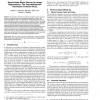Free Online Productivity Tools
i2Speak
i2Symbol
i2OCR
iTex2Img
iWeb2Print
iWeb2Shot
i2Type
iPdf2Split
iPdf2Merge
i2Bopomofo
i2Arabic
i2Style
i2Image
i2PDF
iLatex2Rtf
Sci2ools
PAMI
2002
2002
Approximate Bayes Factors for Image Segmentation: The Pseudolikelihood Information Criterion (PLIC)
We propose a method for choosing the number of colors or true gray levels in an image; this allows fully automatic segmentation of images. Our underlying probability model is a hidden Markov random field. Each number of colors considered is viewed as corresponding to a statistical model for the image, and the resulting models are compared via approximate Bayes factors. The Bayes factors are approximated using BIC (Bayesian Information Criterion), where the required maximized likelihood is approximated by the Qian-Titterington pseudolikelihood. We call the resulting criterion PLIC (Pseudolikelihood Information Criterion). We also discuss a simpler approximation, MMIC (Marginal Mixture Information Criterion), which is based only on the marginal distribution of pixel values. This turns out to be useful for initialization and it also has moderately good performance by itself when the amount of spatial dependence in an image is low. We apply PLIC and MMIC to a medical image segmentation pro...
| Added | 23 Dec 2010 |
| Updated | 23 Dec 2010 |
| Type | Journal |
| Year | 2002 |
| Where | PAMI |
| Authors | Derek C. Stanford, Adrian E. Raftery |
Comments (0)

